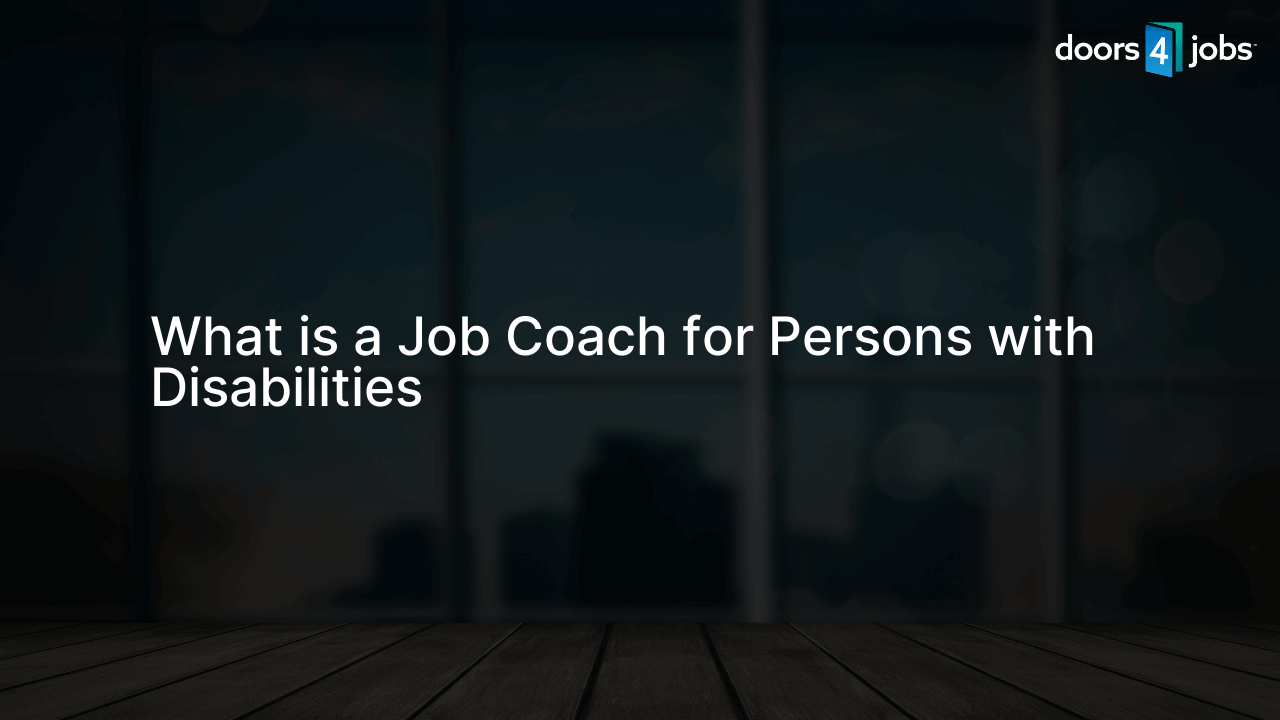A Job Coach for Persons with Disabilities is a trained professional who specializes in assisting individuals with disabilities in developing employability skills, overcoming challenges, and identifying suitable job opportunities. Their primary objective is to empower these individuals by offering personalized guidance and support, from job search techniques to workplace accommodations, ensuring they successfully find and maintain suitable employment.
Understanding the Role of a Job Coach
A Job Coach for Persons with Disabilities is a professional who works with individuals with disabilities to facilitate their entry and success in the workforce. Through individualized support and guidance, a Job Coach helps clients overcome obstacles, develop valuable skills, and build confidence to achieve their career goals. The coach collaborates with employers to create an inclusive working environment and ensure accommodation needs are met.
Job Coaching Services: A Holistic Approach
Employability Skills Assessment
A Job Coach evaluates clients’ strengths, challenges, and interests to determine potential careers and develop a targeted employment plan. The assessment may include exploring transferable skills, practical abilities, and relevant experience.
Job Search Strategies
Job Coaches teach effective job search techniques, such as networking, utilizing online job boards, and crafting résumés and cover letters. They also provide guidance on how to find disability-friendly employers and apply for appropriate job opportunities.
Interview Preparation
Job Coaches offer personalized coaching on interview skills, emphasizing how to address disability-related questions, showcase abilities, and project a professional image. This may include conducting mock interviews and providing feedback to enhance performance.
Workplace Accommodations
The Job Coach liaises with employers to establish necessary accommodations for clients, ensuring a supportive and inclusive work environment. This might involve ergonomic adjustments, adapted equipment, or flexible schedules.
On-the-Job Training and Support
Once a client secures employment, the Job Coach provides ongoing support to help them adapt and thrive. This may include training, mentoring, and facilitating communication between the client and their employer.
Selecting the Right Job Coach
For a fruitful partnership, it’s important to select a Job Coach with experience and expertise in working with persons with disabilities. This may include credentials like a Certified Employment Support Professional (CESP) or extensive experience in the field. Additionally, consider factors such as the coach’s communication style, approach, and willingness to provide the necessary support to ensure both the client and employer achieve success.
Benefits of Working with a Job Coach
Partnering with a Job Coach offers numerous advantages for persons with disabilities seeking employment. These professionals provide knowledgeable guidance, helping clients navigate the job market and secure positions that align with their interests and abilities. Benefits include:
- Increased confidence and self-esteem
- Improved job search efficiency
- Enhanced interview and employability skills
- Access to a broader range of job opportunities
- Higher likelihood of long-term job retention
Collaborating with Vocational Rehabilitation Agencies
Job Coaches might work independently or as part of a vocational rehabilitation agency. These agencies offer comprehensive support services for persons with disabilities, including vocational counseling, skills training, and job placement assistance. When seeking a Job Coach, consider exploring local vocational rehabilitation programs to access a variety of services and resources tailored to your needs.
Funding and Financial Assistance
The cost of a Job Coach’s services may be a concern for some clients. However, financial assistance may be available through various sources, such as vocational rehabilitation agencies, Medicaid, or grant-funded programs. Before engaging a Job Coach, explore potential funding options and determine eligibility criteria to ensure access to affordable, quality services.
Preventing Job Discrimination and Advocating for Clients
One critical aspect of a Job Coach’s role is to advocate for persons with disabilities and uphold their rights to equal opportunities in the workplace. By educating employers about disability laws, such as the Americans with Disabilities Act (ADA), a Job Coach helps prevent discrimination and ensures clients are treated fairly throughout the hiring and employment process. Additionally, Job Coaches can facilitate open communication between clients and employers, promoting a better understanding of each party’s needs and expectations.
FAQs About Job Coaches for Persons with Disabilities
Below we address some common questions related to Job Coaches for persons with disabilities, providing valuable insights to help you better understand their role and potential benefits.
Do Job Coaches specialize in specific disability types?
Job Coaches may have expertise in working with clients with various types of disabilities, including physical, intellectual, developmental, or mental health, among others. While some may specialize in a specific area, it’s essential to choose a coach with experience and understanding of your unique requirements and goals.
Are Job Coaches only available in-person, or do they offer remote services?
Although in-person support may be more common, remote services are becoming increasingly accessible, particularly given the rise of remote work and advancements in video conferencing software. Job Coaches may provide a mix of in-person and remote support, depending on clients’ needs and preferences.
Is there a minimum education or certification requirement for Job Coaches?
While no standardized minimum education or certification is required for Job Coaches, choosing a coach with recognized credentials, such as a Certified Employment Support Professional (CESP), or extensive experience working with persons with disabilities helps ensure you receive skilled and informed guidance.
What if I am already in a job and need ongoing support?
Job Coaches can provide ongoing support even after securing employment, helping clients navigate workplace challenges, develop essential skills, and maintain productive relationships with their employers. This continuous support can enhance job satisfaction and promote long-term success in the workforce.
How long does it take for a Job Coach to help clients secure employment?
The duration of the job coaching process varies greatly, depending on individual goals, challenges, and job market conditions. A Job Coach tailors their support to clients’ unique needs, ensuring they receive appropriate guidance throughout the process until they successfully find and maintain suitable employment.











